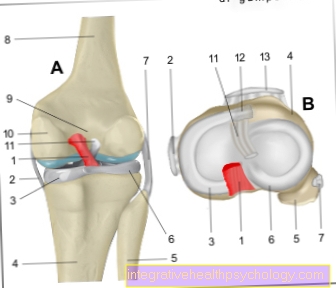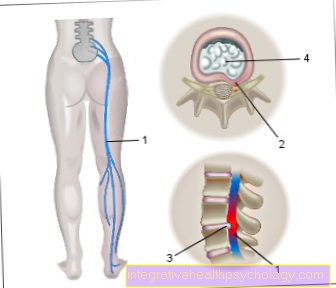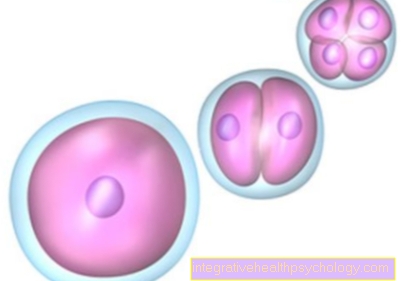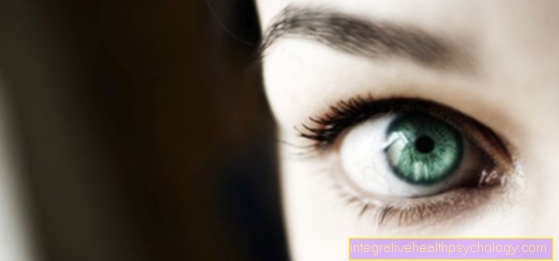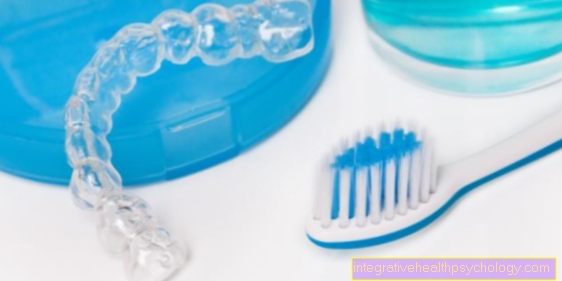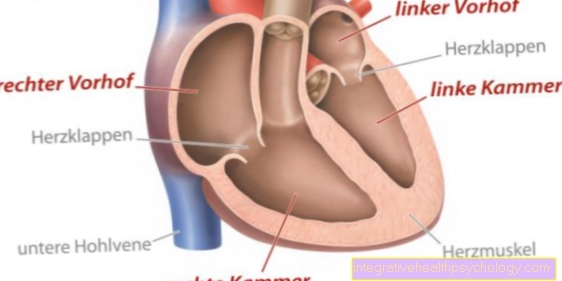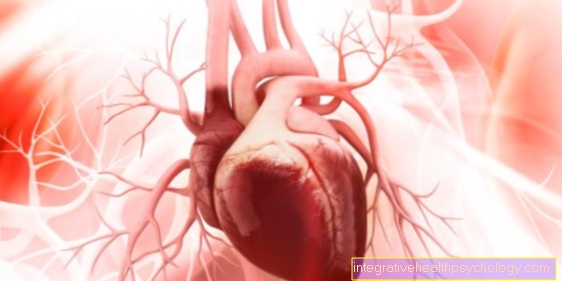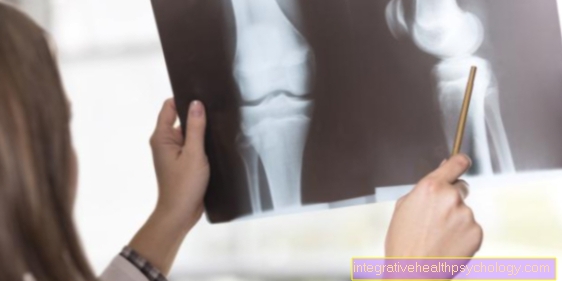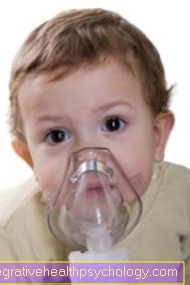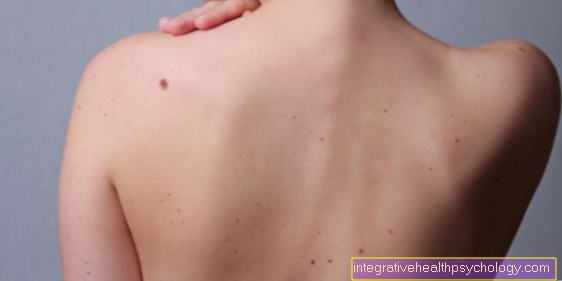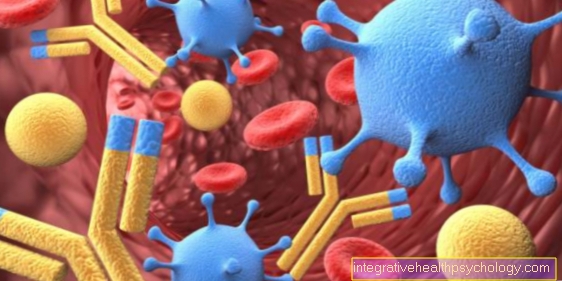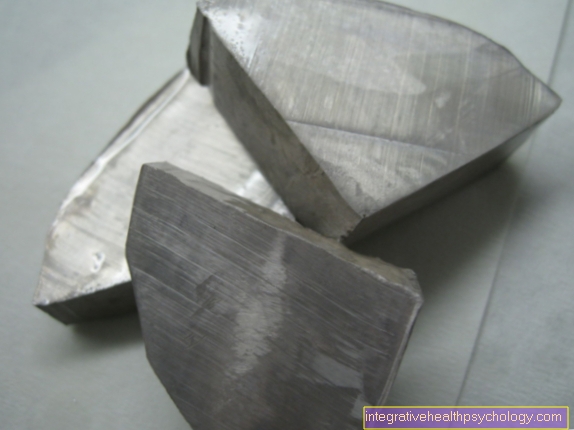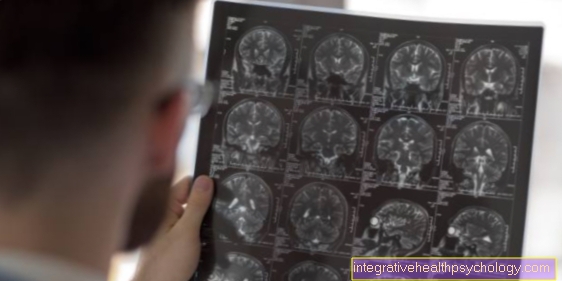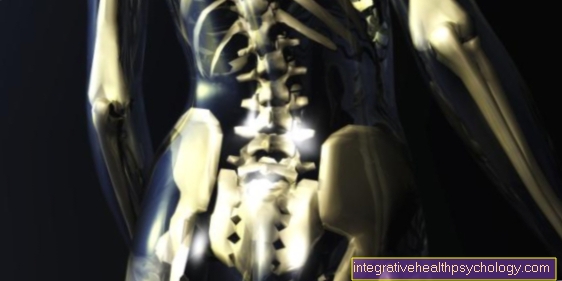Ferritin deficiency
introduction
Ferritin is a substance that is responsible for storing iron in the human body.
A ferritin deficiency therefore means that there has been an iron deficiency for a long time and therefore the iron stores are also used up.
Because of this connection, a ferritin deficiency is usually used synonymously with iron deficiency and iron deficiency anemia (anemia).
However, it can be assumed that a ferritin deficiency causes more severe symptoms than an iron deficiency alone.
Would you like to learn more about the symptoms of iron deficiency? Then read our article:
You can recognize iron deficiency by these symptoms!

Reasons for a ferritin deficiency
There are many reasons for a ferritin deficiency.
Basically, the cause of a ferritin deficiency is a pronounced iron deficiency.
This iron deficiency can be triggered by insufficient iron intake; alternatively, an increased iron requirement or the loss of blood and iron are the reasons for a ferritin deficiency.
Iron is absorbed through the gastrointestinal tract.
Therefore, having a sufficient amount of iron in the diet is important.
Iron is mainly found in red meat, but legumes are also high in iron.
In addition, the absorption of iron in the intestine must be guaranteed.
This can be disturbed in the case of a vitamin deficiency, as the vitamins are required for the absorption of iron.
An increased iron requirement occurs, for example, in children and adolescents when they are in a strong growth phase.
The need for iron and therefore also for ferritin is increased during pregnancy and while breastfeeding.
Endurance athletes also occasionally suffer from a ferritin deficiency due to their increased need.
The loss of iron usually takes place through bleeding.
This can be chronic bleeding, for example in the gastrointestinal tract.
Regular blood loss through menstruation can also be a cause of the ferritin deficiency, which is why women are more often affected by the disease.
Large blood losses, such as those that occur in an accident or major surgery, can also be the cause.
Occasionally, the ferritin deficiency is also caused by a doctor (iatrogenic), for example newborns and infants who have to be treated in hospital for a long time; at risk of a ferritin deficiency, as they have to have blood drawn frequently.
How is the therapy carried out?
Therapy for ferritin deficiency is based on two pillars: First, the iron stores must be replenished by giving the body a lot of iron.
On the other hand, the cause of the ferritin deficiency must be treated or the lifestyle adapted according to the cause.
If there is not only an iron deficiency, but also a ferritin deficiency, this deficiency can no longer be treated with a change in diet alone. Instead, the iron must also be substituted.
The most effective method is to give iron into the vein or an iron syringe into the muscle.
Usually, however, the administration of iron tablets is preferred to invasive treatment methods. Since the iron value cannot suddenly rise again during drug therapy, the iron tablets must be given for several months.
The treatment should usually last three to six months.
In addition, you should support the body with an increased supply of iron through food.
Iron is found mainly in red meat and legumes such as beans, peas and green spelled.
Soy, pine nuts, pumpkin seeds and oatmeal also contain a lot of iron.
The daily iron intake should be 10 to 12 mg per day, during breastfeeding the requirement increases to 20 mg per day, during pregnancy it is 30 mg.
Also read our related article: This is how you fix an iron deficiency
Duration until a ferritin deficiency has been remedied
How long it takes to correct a ferritin deficiency depends on the type of iron absorption.
When given intravenously or intramuscularly, the iron stores are usually replenished within a few weeks; when given iron in the form of tablets, the body needs several months until the ferritin deficiency is remedied.
Even after the iron stores have been replenished, attention should be paid to an iron-rich diet.
Diagnostics for ferritin deficiency
The diagnosis of ferritin deficiency begins with the anamnesis, during which the doctor should ask about the typical symptoms as well as the possible reasons for a ferritin deficiency.
The diagnosis can usually be made after a blood sample has been taken and the blood has been analyzed in the laboratory.
When making a diagnosis, it is important that the ferritin value has fallen below the normal value.
In addition, the hemoglobin value (red blood pigment), the erythrocytes (red blood cells), the iron in the blood and the transferrin (iron transport protein) should be examined.
If there are indications of pathological causes of the ferritin deficiency, these should also be examined, for example through a gastrointestinal mirror or an examination by the gynecologist.
You may also be interested in our next article: Cost of a colonoscopy
Normal values of ferritin
The normal values for ferritin depend on both age and gender.
For women, the normal range before menopause (end of the menstrual period) is between 20 and 110 ng / ml, after which the ferritin value should be between 15 and 650 ng / ml.
For men, the limit values are slightly higher: between 18 and 50, the value should be between 30 and 300 ng / ml, then between 5 and 660 ng / ml.
In infants, the normal value for ferritin is 90 to 630 ng / ml, with increasing age the normal range initially decreases to 40 to 220 ng / ml.
You can recognize a ferritin deficiency by these symptoms
The symptoms of ferritin deficiency are the same as those of iron deficiency, only the symptoms are usually more pronounced than in isolated iron deficiency anemia.
The lack of ferritin and iron leads to complaints such as headaches and dizziness, as well as increased concentration disorders and poor performance.
Increased fatigue and sleep disorders also lead to a state of exhaustion.
The ferritin deficiency is often also associated with a low tolerance to cold, and affected people are significantly more likely to freeze.
The ferritin deficiency manifests itself particularly quickly during physical exertion.
If the iron stores are exhausted, only a smaller amount of the red blood pigment hemoglobin can be formed.
This molecule is used to transport oxygen in the blood.
If there is a lack of hemoglobin, the oxygen supply to the body suffers.
As a result, there is more difficulty breathing during physical exertion, and those affected are significantly less physically efficient.
In addition, tachycardia, i.e. a significantly increased heart rate, can be noticed.
Hair loss
Hair loss is also a symptom of a ferritin deficiency, but it usually only occurs when an iron and ferritin deficiency has been present for a long time.
Iron is important for hair growth, so if it is deficient, the structure of the hair changes, making it fragile and thin.
If the deficiency persists for a long time, hair loss can occur.
Read how you can combat hair loss at: This is how you treat hair loss
These are the long-term consequences
The long-term consequences of the ferritin deficiency can be divided into two areas: on the one hand, many physical complaints arise, but at the same time the psyche is also influenced by the ferritin deficiency after a certain time.
The lack of iron initially reduces physical performance, there is increased fatigue and concentration disorders, sometimes severe headaches can occur as a long-term consequence.
Serious organs are very rarely damaged because they can no longer be adequately supplied with oxygen, especially during physical exertion. Chronic fatigue and poor performance also affect the psyche.
So long-lasting states of exhaustion can occur, which in the worst case lead to a loss of zest for life.
In the long term, ferritin and iron deficiency can lead to mental disorders such as depressive episodes.
You can find out which criteria can be used to recognize depression at:
This is how you can recognize depression!
This is what the course of the disease looks like
The ferritin deficiency is a consequence of the iron deficiency and is usually initially noticeable through unspecific symptoms such as increased tiredness, poor concentration and paleness.
In the course of the exercise, pronounced physical inefficiency as well as an increased pulse and increased shortness of breath can be noticed.
With a pronounced ferritin deficiency, chronic fatigue develops, as well as sleep disorders and headaches
In the long run this can have a negative effect on the state of mind and the joy of life.

